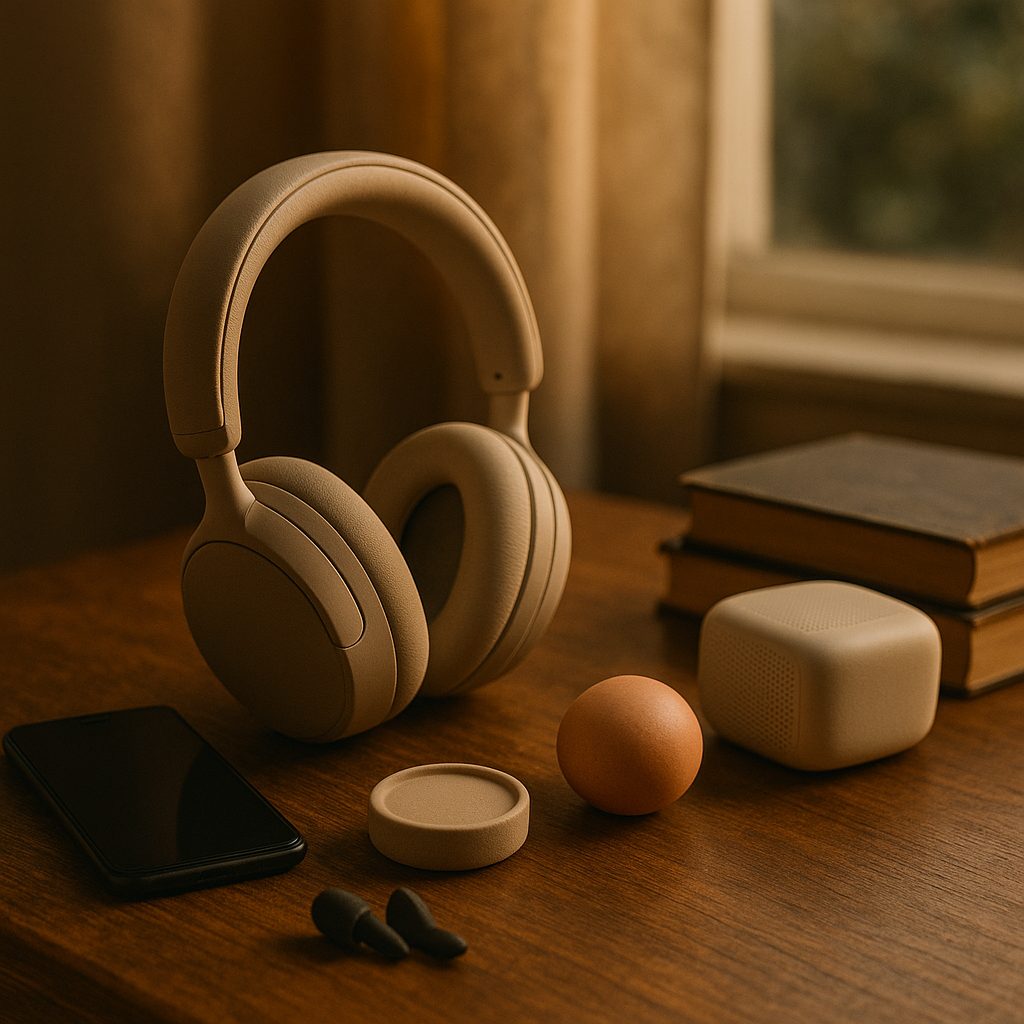Highly Sensitive Person Coping With Noise: Christian Guide
Estimated reading time: 6 minutes
Introduction
As a highly sensitive person coping with noise, you want calm without withdrawing from life. Moreover, you want practical steps that honor your faith and your nervous system. This article distills the key findings from our research PDF and grounds each step in Scripture so you can act today.
Noise hits sensitive nervous systems harder because the brain amplifies sound and triggers a faster fight‑or‑flight cascade. However, God has not left you powerless. Therefore, you can shape your environment, retrain your stress response, and invite Christ’s peace to rule your heart. As a result, daily life becomes more livable even when the world stays loud.
For quick background, see concise medical explainers on sensory processing sensitivity, public‑health guidance on environmental noise, and patient advice on hyperacusis. Additionally, you can build daily skills from our cornerstone guides on deep breathing exercises and calming your nervous system.
Why Noise Overwhelms The HSP Nervous System
Researchers estimate that many people process stimuli more deeply. Consequently, ordinary sounds can feel intrusive for an HSP. Your auditory system may amplify input, which raises heart rate, tightens muscles, and narrows attention. Therefore, a barking dog or humming fan can feel like a threat.
Nonetheless, physiology is only half the story. Scripture reminds us that we are “fearfully and wonderfully made” (Psalm 139:14). Because of that truth, sensitivity is not failure. Instead, it is a stewardship task. You can guard your heart (Proverbs 4:23) and choose practices that reduce arousal. Likewise, you can seek calm while remaining present in relationships and service.
For clinical framing, the noise sensitivity and anxiety overview outlines lifestyle and therapy options. Likewise, Cleveland Clinic explains when to seek medical assessment. Meanwhile, internal strategies such as grounding techniques and a full HSP guide help you respond, not react.
Practical Ways To Reduce Daily Sound Overload
Start with the soundscape you control. Seal window gaps, add thick curtains, and place books or rugs to absorb echoes. Additionally, choose quieter appliances and use door sweeps to block hallway noise. Small tweaks often lower stress fast.
Use protection wisely. High‑fidelity earplugs lower volume without muffling voices, and noise‑canceling headphones create a personal bubble. However, avoid wearing plugs all day because total avoidance can heighten sensitivity; the UK’s National Health Service cautions against overusing earplugs and recommends gradual sound exposure when safe (NHS guidance). Therefore, protect yourself during peaks, then allow ordinary sounds again as you recover.
When the world intrudes, step away briefly. Go to a “quiet corner,” pray, and reset. Moreover, plan a daily quiet hour at home for everyone. For workplace focus, combine headphones with gentle masking such as a white‑noise fan. For a fuller checklist drawn from clinical and pastoral guidance, see the full research summary and our practical notes.

Build Body And Mind Resilience
Resilience grows in ordinary routines. Sleep at consistent times. Eat regular meals to stabilize blood sugar. Exercise most days to burn stress hormones and lift mood. Moreover, brief resets during the day help your system downshift.
Practice slow breathing for two minutes. As you inhale for four counts and exhale for six, your parasympathetic system engages. Consequently, your heart rate falls and muscles release. Pair the breath with a short prayer such as “Be still and know that I am God” (Psalm 46:10). Therefore, you tie physiology to faith. For structured routines, see our step‑by‑step nervous system guide.
During spikes, ground through the senses. Name five things you see, four you touch, three you hear, two you smell, and one you taste. Additionally, hold a verse card or squeeze a stress ball while you count. These quick tools interrupt escalation and give your brain a new target. For further Scripture‑based examples, consult the PDF that undergirds this article.
Faith Practices That Anchor Peace Amid Sound
Jesus often withdrew to quiet places to pray (Luke 5:16). Likewise, schedule daily silence, read Scripture, and cast your anxiety on Him (1 Peter 5:7). As a result, your mind refocuses on the Lord’s steady presence. Moreover, worship music at soft volume can nudge mood toward hope without overstimulation.
Memorize short promises for fast recall. For example, “The Lord will fight for you; you need only be still” (Exodus 14:14) and “The peace of God will guard your heart and mind in Christ Jesus” (Philippians 4:7). Therefore, when a siren blares, you already have words that settle you. Additionally, practice gratitude and reframe intrusive sounds as prompts to pray for others.
Community matters, too. Ask trusted friends to pray when noise overwhelms. Additionally, share this plan with family so they understand your limits. For related frameworks on stress, overthinking, and panic relief, read our cornerstone essays on reducing rumination, a full sensory overload guide, and the quick panic attack relief guide.

Amazon Product Recommendations For Immediate Relief
The right tools provide quick wins while deeper habits build. Below are reader‑tested items. Each link uses our affiliate tag to support free resources.
- Sony WH‑1000XM5 Noise‑Canceling Headphones – top‑tier cancellation for travel and open offices.
- Bose QuietComfort Ultra – plush comfort that many HSPs tolerate for long sessions.
- Loop High‑Fidelity Earplugs – lower volume while keeping speech clear for church or restaurants.
- LectroFan White Noise Machine – consistent sound masking for sleep and naps.
- Under‑Door Sound‑Blocking Sweep – seals gaps that leak hallway noise into apartments.
- Blackout Sound‑Dampening Curtains – add mass that absorbs echoes and street sound.
Use protection during spikes. However, reintroduce everyday sounds as you stabilize so that long‑term tolerance improves. This balanced approach supports any highly sensitive person coping with noise. For medical nuance and faith‑based encouragement, review the complete research notes.
Conclusion: Walk Quietly With Confidence
Noise may not fade, yet your choices change your experience. Therefore, shape your space, practice daily resets, and lean into the presence of Christ. Moreover, ask for help when needed from clinicians and trusted friends.
If you keep practicing, small wins compound. Consequently, your days feel steadier and your nights recover faster. In brief, this plan helps any highly sensitive person coping with noise build durable peace without isolation.







